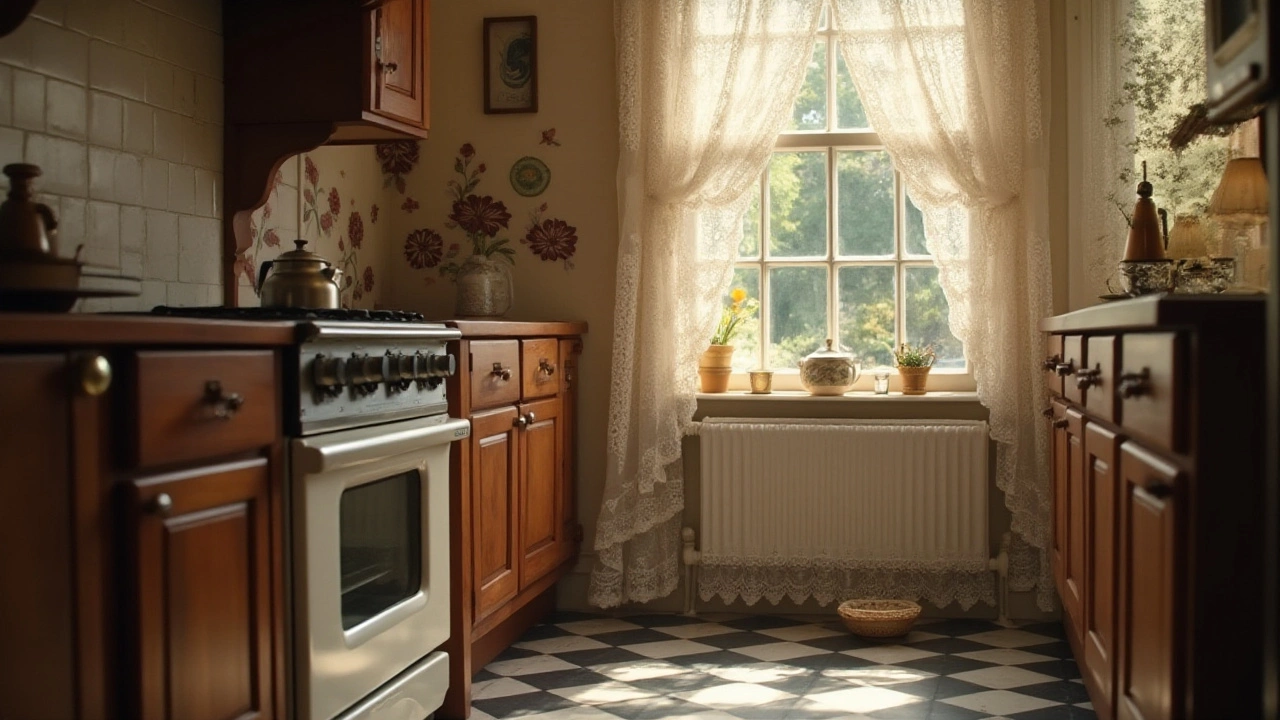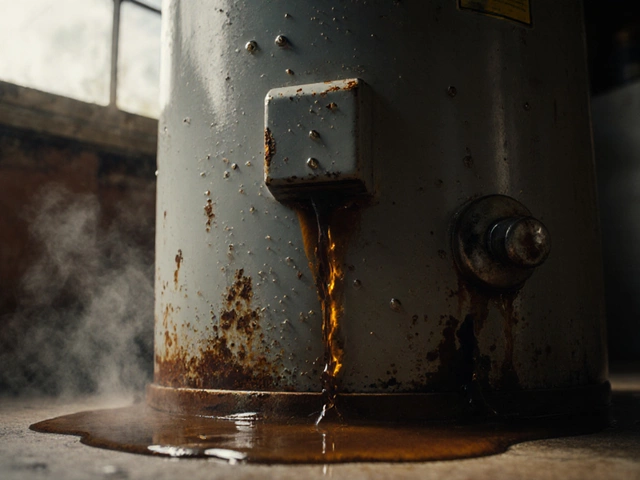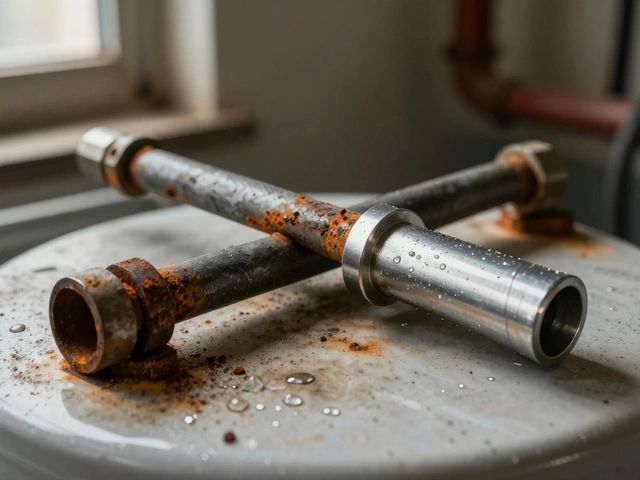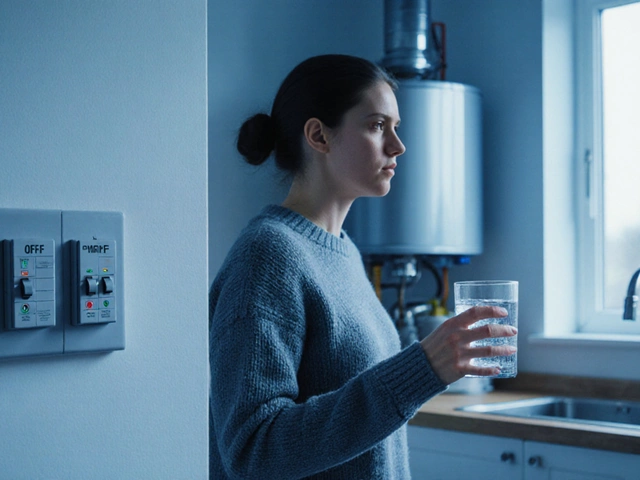When it comes to keeping your showers warm and your dishes clean, the unsung hero of the household is surely the water heater. But just how long can you expect this vital piece of equipment to last before it's time for a replacement? Understanding the average lifespan of water heaters is essential to preventing any unexpected hiccups in your home's ability to supply hot water.
The lifespan of a water heater can often depend on factors like the type you have, the quality of the installation, and how well you've maintained it over the years. With a bit of knowledge and some handy tips, you can extend the life of your heater and ensure it performs efficiently throughout its expected duration.
- Understanding Water Heater Longevity
- Types of Water Heaters
- Signs Your Water Heater Needs Replacement
- Maintenance Tips for Prolonging Life
- Energy-Efficient Water Heater Options
- Final Thoughts on Water Heater Lifespan
Understanding Water Heater Longevity
When debating on how long a water heater should last, it’s helpful to think about a span rather than a single number. Generally, the life expectancy of traditional tank-based water heaters is somewhere in the realm of eight to twelve years. This timeframe is largely an estimate, influenced by the type of heater, how it's used, and the level of maintenance it receives throughout its life. It's crucial for homeowners to have an understanding of these different factors.
The most common type of water heater in homes is the tanked variety, where water is stored and heated continuously, ensuring a supply of hot water is always ready. Tank heaters traditionally last for a decade when they are appropriately maintained. On the other hand, tankless water heaters, which heat water on demand, can often last as long as twenty years. Their longevity benefits stem from the reduced stress of maintaining hot water continuously. Despite their long life, they require different upkeep strategies due to their design and operational principle.
According to Consumer Reports, "Most water heaters last about 10 years. Minimize the risk of an unexpected cold shower by replacing your old water heater before it fails."
The durability of water heaters also leans heavily on the material used in the inner tank lining. Glass-lined tanks are built to resist corrosion; however, if the lining is damaged, it may lead to early failure. Some high-end models feature stainless-steel tanks that resist corrosion far better than traditional models, providing quite a boost to their lifespan.
One essential yet sometimes overlooked factor in a water heater's longevity is the quality of water it handles. Hard water, rich with minerals like calcium and magnesium, can cause scaling, put stress on the water heater, and potentially shorten its life. Installing a water softener can combat this issue effectively, prolonging not only the life of the heater but also enhancing the efficiency of appliances that rely on warm water. According to research, homes with hard water conditions may experience about a 30% increase in scale deposits within their plumbing and appliances.
Lastly, it’s worth highlighting the role of regular inspections and maintenance services. Flushing out the tank once or twice a year helps remove sediment buildup, which can insulate the heating elements, forcing them to work harder and wear out faster. Similarly, checking the anode rod and replacing it every few years is a simple action that can stave off corrosion inside the tank. Regularly scheduled maintenance services, even for systems that seem to be operating well, are invaluable in extending the usability of your water heater.
Types of Water Heaters
When considering a new water heater, it's imperative to recognize the variety of options available. Each type has its unique characteristics and advantages, fitting diverse household needs and preferences. The most common types include traditional tank water heaters, tankless or on-demand models, heat pump water heaters, and solar water heaters.
Let's begin with the traditional storage tank water heaters, which are ubiquitous in many homes. They maintain a reservoir of hot water that is constantly heated to ensure you have hot water ready whenever you need it. These heaters generally have a lifespan of around 10 to 15 years and are available in various sizes to accommodate different household demands. Despite being the standard, they could be less energy efficient compared to newer technologies, leading to higher utility bills.
Tankless water heaters, often referred to as on-demand water heaters, have become increasingly popular due to their energy efficiency and endless supply of hot water. Unlike traditional tank heaters, they heat water directly without storing it, which can save both energy and space. This type typically has a longer lifespan, ranging from 15 to 20 years. A significant advantage of tankless systems is their compact size, which can fit in tight spaces where a massive tank would never work. However, the initial cost might be higher, which may affect the average consumer's decision.
Another interesting option is the heat pump water heater, which utilizes electricity to move heat from one place to another instead of generating heat directly. This makes them two to three times more energy-efficient than conventional electric resistance water heaters. They can last upwards of 13 to 15 years with proper maintenance. However, their efficiency may decrease in colder climates since they rely on ambient temperature to function optimally. Heat pump water heaters are ideal in homes where the climate remains relatively warm for most of the year, providing an eco-friendly choice for homeowners.
Solar water heaters are the epitome of sustainability, harnessing the power of the sun to heat water for your home. While they have the potential to significantly reduce utility bills, their effectiveness heavily relies on the availability of direct sunlight. They often come with backup systems to cover periods when sunlight is insufficient. Their initial installation cost can be higher, but the long-term savings and environmental benefits can outweigh these initial expenses. As a clean energy solution, solar water heaters can be an attractive option for those looking to reduce their carbon footprint.
"Tankless water heaters can be up to 34% more energy-efficient than conventional storage tank heaters, depending on the usage," says the authoritative U.S. Department of Energy.
For those in the midst of deciding which water heater is the best fit for their home, it's crucial to consider not only the immediate costs and installation but also the long-term benefits and sustainability aspects. By selecting the right type, homeowners can ensure they meet their daily water heater lifespan needs efficiently and economically.
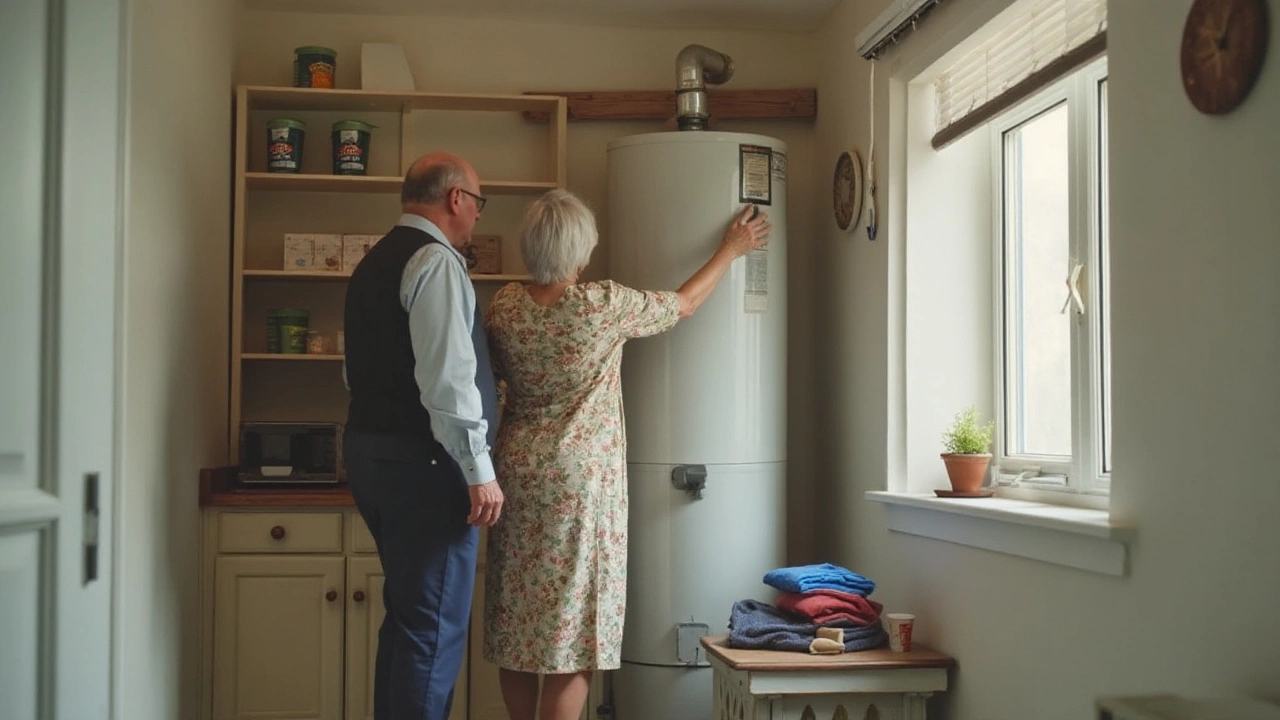
Signs Your Water Heater Needs Replacement
The water heater, like any essential appliance in your home, isn't going to last forever. There comes a time when repairs just won't cut it anymore. Recognizing the signs of a failing water heater can save you from the hassle of unexpected cold showers. One of the most common signs is an inconsistent water temperature. If you find yourself adjusting the faucet only to experience lukewarm or fluctuating water, it's a strong indicator the heater might be on its last legs. This could often mean that the heating elements are wearing out or sediment build-up is affecting its efficiency. This inconsistency in performance isn't just annoying; it can also signal a deeper issue that needs addressing sooner rather than later.
Another telltale sign is water discoloration. When you notice rusty or brown water, it might not just be your pipes. Older water heaters that suffer from corrosion often release particles into the water supply, giving it that unappetizing color. Apart from the aesthetic side, it might lead to possible health implications, therefore warranting immediate attention. A water heater nearing the end of its lifespan often makes rumbling noises. As strange as it sounds, those noises come from hardened sediment knocking around the tank's bottom. This layer of sediment not only diminishes efficiency but also accelerates wear, leading to leaks or cracks. "Ignoring these sounds is akin to ignoring a snowball rolling down a hill; the longer you wait, the bigger the problem gets," warns a plumbing expert in the industry.
Leaks are the most obvious sign, often signaling a dire need for replacement. Even if it starts small around valves or connections, a leak can quickly escalate, causing significant damage to your property. Over time, the metals in the tank expand and contract with heating, causing fractures. Address leaks immediately to avoid a full-blown burst, leading to water damage and expensive repairs. To spot this in early stages, inspect the area around your water heater regularly for any moisture or puddles. The age of a water heater also plays a crucial role. If it's over a decade old, consider replacing it even if it seems to be functioning as usual. Manufacturers usually provide a life expectancy of 8 to 12 years, so hitting that mark means preparing for an upgrade is wise.
Energy efficiency is another consideration. Older units are not only slower but consume more energy, affecting both your utility bills and environmental footprint. Newer replacements tend to offer better heat insulation and digital displays to streamline temperature settings. With energy efficiencies being one-third of the criteria for responsible appliance management, you might even qualify for rebates or tax incentives when upgrading. All these signs, if ignored, culminate in inefficient heating and inflated utility costs. So it becomes essential for a homeowner to be proactive rather than reactive, saving both money and comfort in the long haul. After all, replacing a water heater is not just about maintaining a steady supply of hot water—it’s about the overall, long-term satisfaction of your home’s ecosystem.
Maintenance Tips for Prolonging Life
Taking care of your water heater is much like nurturing a relationship — the more attention and regular check-ins you give it, the longer and stronger it tends to last. Here’s the low-down on how you can pamper your trusty old water heater so it sticks around longer than you expect. Regular maintenance not only helps in avoiding cold showers but also plays a significant role in optimizing the heater's efficiency, saving you money in the long run. Start by setting a schedule for at least an annual check-up even if everything appears just fine.
One of the simplest yet most important tips is draining the tank regularly. Sediment build-up at the bottom is a silent efficiency killer. Flushing it out annually can significantly enhance the unit's operational efficiency and longevity. Remember to cut off the power and let the water cool down before you begin. Then, attach a garden hose to the drain valve and let the water flow out into a bucket or a drain. Don’t be surprised at the amount of sediment you might see. It’s these unwanted sediments that cause the unit to work harder, deteriorating faster.
Inspect the Anode Rod
The anode rod is a crucial component of your water heater, often called the ‘sacrificial’ rod. Its purpose is to attract corrosive elements in the water, keeping the tank from rusting. A typical anode rod lasts about 3 to 5 years; however, this can vary depending on water quality. Inspect it annually and replace it if it’s less than half an inch thick or covered with calcium. This simple step can add years to your tank's life.
The thermostat should not be too high. Excessive heating can cause unnecessary pressure on the unit and potentially dangerous situations, leading to a reduced lifespan. Most manufacturers recommend a setting of about 120 degrees Fahrenheit. This not only helps conserve energy but also reduces the risk of burns. If your water isn’t hot enough at this setting, it might mean the unit needs a bit of love, not necessarily a higher setting. A thermostat set too high is often a hidden culprit in these situations, affecting both water heater lifespan and energy bills.
Insulate Well
Just as we layer up in winter, your water heater can benefit from a bit of insulation, especially if located in a garage, attic, or basement. Insulating your pipes reduces heat loss, allowing you to benefit from the hot water faster and with better efficiency. This can make a remarkable difference in colder climates where heat loss is more pronounced. An insulating blanket or jacket, specifically designed for water heaters, provides this added layer of protection and reflects heat back into the tank.
"According to the U.S. Department of Energy, properly insulating your water heater can reduce heat losses by 25%–45% and save about 7%–16% in water heating costs."
Stay alert to any signs of your heater acting up — unusual noises, signs of rust on the tank body, leaks, or inconsistent water temperature can be early alerts. Catching these signs early and addressing them can save you from a complete replace water heater scenario.
Lastly, it's smart to invest in a professional inspection every couple of years. Even if you're handy around the house, a trained eye can spot issues that you might not. With skilled hands, a pro can validate your water heater maintenance and often make small adjustments that add years to its lifespan.
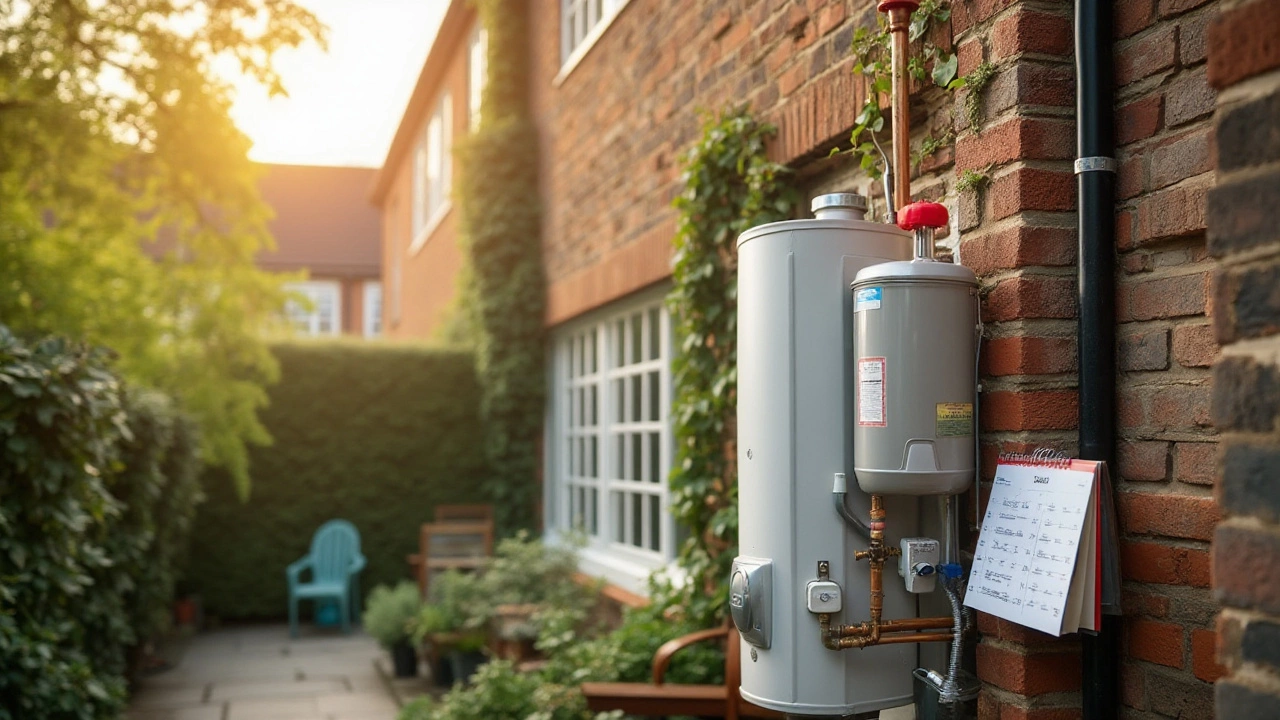
Energy-Efficient Water Heater Options
When considering a replacement for your aging water heater, turning your attention to energy-efficient water heater options is not just a smart move for the environment, but it can also lead to substantial savings on your utility bills. With innovative technology emerging steadily, homeowners now have a variety of choices that not only meet their hot water needs but also engage in energy conservation.
One popular option is the tankless water heater, which is often referred to as an on-demand water heater. Unlike traditional units that keep a reservoir of hot water at the ready, tankless units heat water only as it's needed. This means they operate with increased efficiency and can even last longer, potentially reducing energy usage by 24% to 34% according to some studies. By only heating water when it’s actually required, these systems avoid the standby heat loss associated with conventional hot water tanks.
Hybrid Electric Heat Pump Water Heaters
Meanwhile, hybrid electric heat pump water heaters are another viable path for efficiency. These systems utilize heat from the air and ground to warm your water, incorporating a conventional electric heating element to assist in cooler conditions. They can be two to three times more efficient than conventional electric water heaters. Though they have a higher upfront cost, their energy savings can result in significant cost reductions over time."The Department of Energy estimates that a heat pump water heater could save the average household around $330 per year on energy costs," notes the Environmental Protection Agency.
An often overlooked yet efficient choice is the solar water heater. Especially appealing in sunny climates, these systems rely on rooftop panels to absorb solar energy, which is then used to heat the water supply. While the initial implementation might be more costly, they provide free energy once the installation is done, making them an increasingly attractive choice for those mindful of their carbon footprint.
Moreover, investing in an energy-efficient water heater can sometimes make you eligible for rebates or tax incentives, which can offset the costs of installation. Before deciding on a specific model, homeowners should consider factors such as local climate, household size, and specific usage habits to select the best fit. Comparing the energy factor (EF) — which signifies the efficiency of a water heater — can help guide your choice. The higher the EF, the more efficient the water heater is considered to be.
If you're juggling between different options, consulting with a professional can provide tailored advice based on local conditions. By embracing energy-efficient water heater options, you ensure that you're choosing products that offer sustainable water heating solutions without compromising on reliability or performance. Let your next decision not only comfort your family's bathing needs but also tread lighter on the Earth.
Final Thoughts on Water Heater Lifespan
Contemplating when and how to replace your water heater is a conversation everyone should have with their plumber before a chilly shower forces the issue. It's crucial to acknowledge that all water heaters come with an expiration date, and resisting the inevitable can sometimes lead to unexpected inconveniences. As the years tick by, these humble appliances undergo natural wear-and-tear, influenced by fluctuations in water quality, frequency of use, and maintenance habits. Typically, a traditional tank water heater may last around 8 to 12 years, while a tankless option could boast a lifespan of 20 years or more—provided you treat them right.
Keeping an Eye on Longevity
The secret sauce to extending your water heater lifespan lies in routine care and vigilance. Changes in water temperature, rumbling noises, or rusty water are telltale signs that it's time to assess the health of your heater. A quick chat with your plumber for regular inspections could add valuable years to its life. They can flush the tank, check the anode rod, and ensure the system isn’t working any harder than it needs to. These steps are not just about getting the maximum mileage, but also keeping energy bills and repair costs in check. This kind of preventive maintenance is where you can make the most impact.
The Replacement Mindset
Sometimes, even the best-kept heaters need a farewell party. Embracing the idea of replacement doesn't just mean replacing like-for-like. Today, energy-efficient water heater options abound, and while the initial outlay might be higher, the payback comes in lower running costs and a smaller environmental footprint. A frequent upgrade often repays itself in energy savings alone. According to the Department of Energy,
“A high-efficiency water heater can result in up to 30% energy savings compared with a conventional model.”These figures make it easier to digest the upfront investment and show the real-world impact of technological advancements in the water heater world.
Grasp Opportunities for Improvements
As you stand at the cusp of a new water heater era, use this opportunity to re-evaluate your household's hot water needs. Perhaps you want to integrate a solar water heater or explore a hybrid version that gives you the best of both electricity and traditional heaters. Whatever path you choose, aligning your purchase with projected household needs ensures all boxes are ticked. Water heater maintenance shouldn't be a set it and forget it venture, but rather a continuous dialogue with your comfort needs and eco-conscious choices. By investing time and effort into understanding your system, you not only avoid untimely replacements but also equip your home with the best technology fit for your interests and budget.

